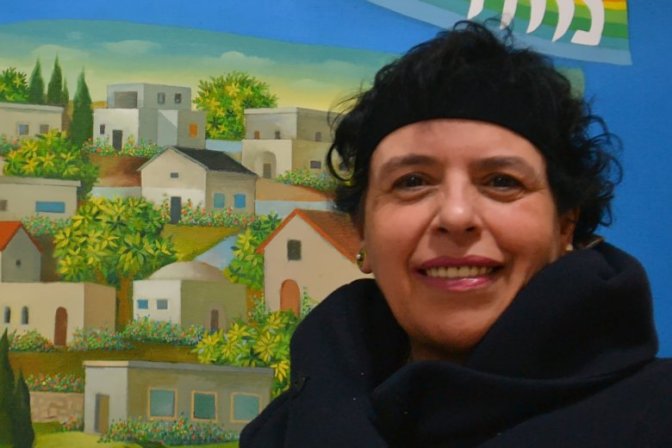Home > Oasis of Peace > Projects & Outreach > Fatin Abdulhalim, outgoing Chair of the Educational Association
Fatin Abdulhalim, outgoing Chair of the Educational Association
Fatin, a member of the Board of the Educational Association and its Chair for two years, reflects on the Board’s recent accomplishments
Wednesday 27 October 2021, by

An interview with Fatin on two intensive years
Just prior to new elections for the WASNS educational association board, the incumbent chair, Faten Abdulhalim reflects on two years of intensive activity and renewal.
What does the position of chair of the educational association entail?
“Even while serving as chair, the position of board member always came first in my mind.
“The chair must represent the association in everything – practical as well as principles. You have the ultimate responsibility for everything that happens, from A to Z. That means that at every stage you have to be involved, and you must employ the correct considerations in deciding how to move forward or possibly to stop.
“When I began my term, we were lacking a salaried director. The board members and I took the job on ourselves, in our spare time. Even though we divided up the tasks, it was a lot of work. We had to take responsibility from the beginning to the end of any project.
“Only a year later did we hire Nir Sharon as director of the children’s education institutions [of the primary school, pre-school levels and Nadi Youth Club]. This took a big weight off our shoulders. Still we continued to be closely involved. After all, we are talking about education. Nir has done some wonderful things, and these have taken place with our support and input.
“Our board was composed of well-qualified people. I come from the field of education; and the other members included a school psychologist, a social worker, a director of an educational NGO and a lawyer. We functioned both as board members and consultants. Even after hiring a director, our professional tools came into use.
“Maybe for the first time in the association’s history, the board was able to create a change in magnitude – I think it’s been revolutionary.”
So what were you able to achieve?
“First, the nursery was deeply in debt and on the verge of closing. We had to decide whether to close it down or to invest. The decision to keep it open was not an easy one. We pulled together our resources and invested unimaginable amounts of time. We moved it from its old building to new premises. Now it is doing great, with staff members who are either fully qualified or in the process of completing their professional requirements. We have 12 children, soon to be 13, and the nursery is among the best in the region.
“The Nadi Youth Club is another example. We did some really basic, essential work in learning about the different age groups and what would be needed to draw the kids back to activities. We hired a second coordinator and raised the budget for activities. The results have been amazing.
“The most serious revolution took place in the primary school. With Carmella in her final year at the school, our major objective was to locate and select a new principal. The process was led by Nir and we also got the parents involved. With complete objectivity and professionalism, we found the best person for the job.
“Meanwhile, at the School for Peace, with Nava close to retirement age, it was time to appoint a new director. A senior staff member, Dr. Roi Silberberg took over the leadership in early 2020.
“We also brought some changes to ideas about work in our educational institutions. We felt the need to enforce term limits for the directors in order to facilitate periodic renewal. We insisted that hiring be done on the basis of merit – the person best qualified for the job. We focused on the working relations between the institutions and the balance of power between their directors; aiming to get all of them to work together as a team. And we tried to establish a culture of volunteering, so that when a person leaves a paid position, they continue to provide expertise and time. These changes have not always been easy.”
Sounds like there were a lot of changes over the past two years.
“It was very intensive. The board proved itself to be determined, daring, dedicated and willing to work incredibly hard. And even though we oversaw people in paid positions, we were all volunteers. But none of us took it in that way – we just saw that we had a very important job to do.
“We discussed, learned and worked for hours in our weekly meetings. And if meetings were cancelled or questions or issues arose in-between meetings, we were on WhatsApp, sometimes 24 hours a day.
“During that time, we also took responsibility for creating a work-plan for the coronavirus restrictions, deciding on reducing work hours and unpaid vacations. When we went back to normal, we needed to program for that, as well.”
What are your intentions for the future?
“I am a teacher – of literature and language. But I don’t know if I’ll go back to teaching. I loved the subject matter more than actually teaching, though I always formed a deep emotional bond with the children. But I think that young children need younger teachers – teachers who have an older generation around for advice, guidance, management and steering.
“My husband is a physics professor at Ben Gurion University, and he is up for another Sabbatical year. So I will be taking a break after these two intensive years.”